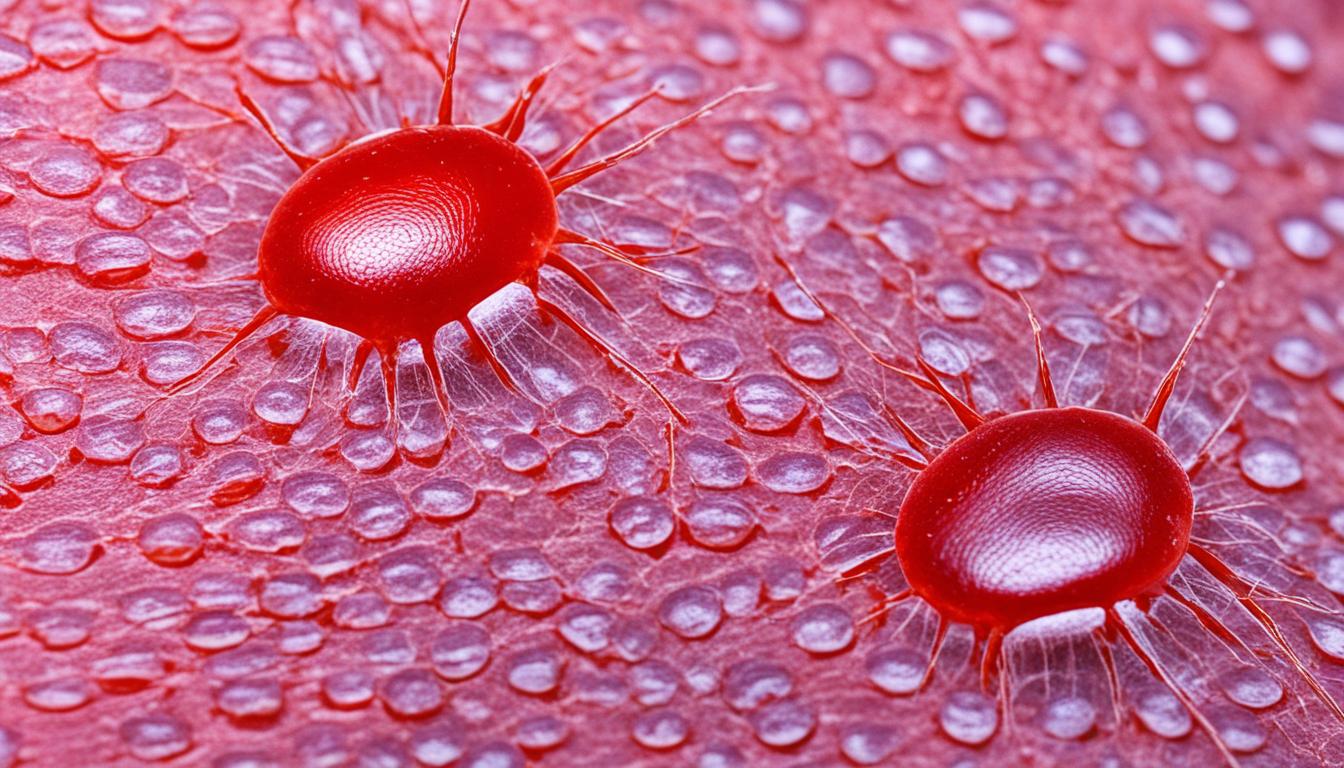Body lice are bugs that live on people and are called Pediculus humanus corporis. They often affect young children. This infestation can make your body itch a lot. If not treated, it could reduce the iron in your blood, causing a condition known as anemia. It’s critical to check for them regularly and treat as needed.
When you have body lice, you probably won’t feel well. Knowing what to look for and how to treat it is very important. This helps stop the problem from getting worse and spreading to others.
Key Takeaways:
- Body lice infestation is a parasitic condition that commonly affects children.
- Symptoms include severe itching, visible presence of lice or eggs, and secondary skin infections.
- Body lice can be transmitted through close contact or sharing contaminated items.
- Proper hygiene practices, such as frequent washing of clothing and bedding, can help prevent infestations.
- In severe cases, stem cell therapy may be a potential treatment option for body lice infestation.
Symptoms of Body Lice Infestation
Body lice infestation shows several noticeable signs. If you feel any of these, it’s wise to see a doctor. They will help you find the right treatment.
1. Severe Itching
Severe itching is a common sign of body lice. It often happens in places like your armpits, groin, and waist. This itching can be very upsetting and might get worse at night.
2. Visible Signs of Infestation
If you see lice or their eggs on your body or clothes, it’s a clear sign. You may notice tiny insects moving on your skin. Or find small white or yellow eggs stuck to hair or clothing.
3. Skin Irritation and Redness
Too much scratching can make your skin red and irritated. Rubbing and scratching can hurt. It also makes you feel even more itchy.
4. Secondary Bacterial Infections
Scratching can break your skin and let bacteria in. This could lead to more serious infections. The area might get swollen, painful, or have pus.
Knowing these signs early on is important. If you think you have body lice, see a doctor. They can diagnose you and suggest the best ways to treat it.
Causes and Risk Factors of Body Lice Infestation
Body lice infestation comes from different factors and spreads by close contact or sharing dirty items. It’s key to know what causes body lice and the risks to stop it from spreading.
Transmission and Spread
Close contact with an infested person or sharing their dirty clothes, bedding, or personal things mostly spreads body lice. If you touch these, lice can move to you. That’s why they often spread in crowded or unclean places.
Risk Factors for Body Lice Infestation
There are several risks that can make you more likely to get body lice:
- Not keeping clean by bathing regularly and wearing washed clothes lowers your chance of getting body lice.
- Living in tight spaces without enough clean bathroom access helps body lice spread quickly.
- If you can’t keep your clothes or yourself clean because of a lack of facilities, you have a higher chance of getting body lice.
- People without homes struggle to get clean clothes or bathe, meaning they’re at greater risk of body lice infestation.
To lower the number of body lice cases, it’s essential to tackle these risk factors. This includes encouraging cleanliness and better living environments.
Diagnosis and Treatment of Body Lice Infestation
Diagnosing body lice is about finding lice or their eggs on the body or clothes. Doctors look closely at places like the scalp, armpits, and groin to spot them.
For treatment, doctors often prescribe medications like permethrin or malathion. These are put directly on the skin to kill lice and their eggs. It’s also important to keep clean. You should wash your clothes and bedding in hot water often. By staying clean, you can keep lice away.
In serious cases, stem cell therapy might help with body lice. Stem cells can heal damaged tissues. But, we’re still learning how well this type of therapy works for lice.
FAQ
Q: What are the symptoms of body lice infestation?
A: Body lice infestation causes intense itching. This happens mostly in places like the armpits, groin, and waist. You might see lice or their eggs on the body or clothes. If you scratch a lot, this can irritate the skin. It might become red or get infected with bacteria.
Q: How is body lice infestation transmitted?
A: Body lice spread through close contact with people who have them. They can also spread through sharing clothes, bedding, or personal items. Places with poor cleanliness or too many people can have a lot of lice. Not having clean clothes or showers also makes it more likely for someone to get body lice. Being homeless increases this risk as well.
Q: How is body lice infestation diagnosed and treated?
A: Finding lice or eggs on the body or clothing helps diagnose body lice. It’s important to look closely at the scalp, armpits, and groin. Doctors can treat lice with medicines like permethrin or malathion. These are put on the skin where the lice are. Keeping clean by washing clothes and bedding in hot water helps. In bad cases, doctors might consider using stem cell therapy for treatment. Stem cells can repair damaged skin, which helps it heal. But, more studies are needed to confirm how well this treatment works for body lice.

